The Most Iconic Food Scenes In 'The Sopranos'
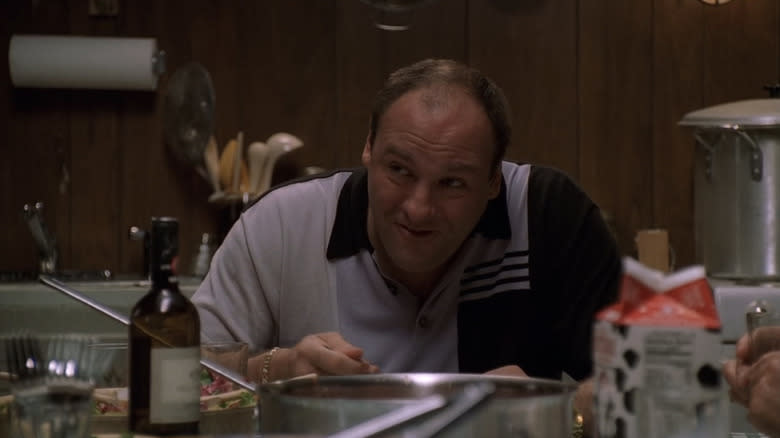
- Oops!Something went wrong.Please try again later.
Since "The Sopranos" began its unparalleled run in 1999, it's seemingly found itself on nearly every "best of" TV ranking list that's come after its premier season. The vivid characters, thoughtful storytelling, and gritty realism made this show truly unforgettable. But one thing that can't be overlooked in the series is the importance of food to the character's journeys.
The show focuses on Tony Soprano, a New Jersey-based, high-ranking member of the Italian-American mafia as he navigates a tumultuous life due to his criminal connections, complicated family life, and suffering mental health. And one of the through-lines of each of these complicated areas of his life is food. Whether we look at Tony's countless dinners at Vesuvio's, hours spent idling away at Satriale's butcher shop, eating Sunday dinner with his toxic narcissist mother, or eating gabagool from the fridge in his bathrobe, food is at the heart of many of the most iconic scenes from "The Sopranos."
Read more: Sausage Brands Made With The Highest & Lowest Quality Ingredients
Lights Out At Vesuvio
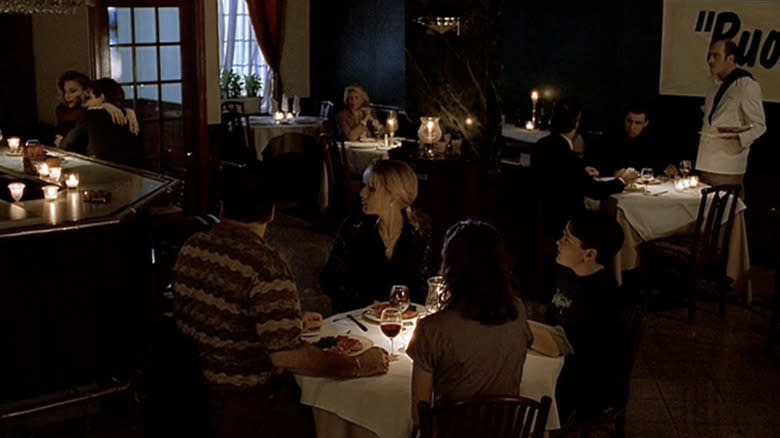
In "I Dream of Jeanie Cusamano," the finale of the first season of "The Sopranos," Tony and his family get caught in a storm that has caused massive power outages across the city. Tony, still reeling from learning that his mother encouraged his uncle to put a hit on him earlier in the season, drives to his friend Artie Bucco's restaurant Vesuvio, who reluctantly lets the family in to have dinner, where much of his crew has already assembled.
Enjoying their meal by candlelight with his wife Carmela and two children, Tony says he'd like to make a toast to his family. In one of the most remembered sentimental speeches of the show's run, Tony says that he hopes that when his children have children of their own, they will remember the little moments like this one, that are seemingly insignificant, but wholesome and good nonetheless. This small moment of family and freshly cooked Italian food, protected from the raging storm outside, shows the optimism and sentimentality Tony has despite the countless horrors he faces (and orchestrates) day to day.
Years later, Tony's son, Anthony Junior, reminds Tony of this advice in the series finale, just moments before the infamous cut-to-black scene. Tony has no recollection of this memory.
The Mother Country
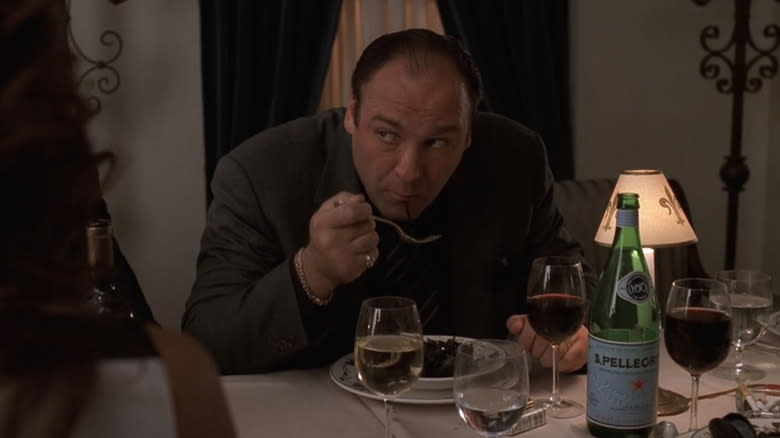
In order to strengthen ties to Tony's ancestral home and international crime family, he flies to Sicily with Paulie Walnuts and Christopher Moltisanti in season 2, episode 4, "Commendatori." The entire episode sheds light on how far removed Tony is from his Italian organized crime origins. No other scene demonstrates this quite as well as when Tony and Paulie join their Sicilian counterparts for a classic Italian dinner.
Tony fumbles through his communications with the leader of the pack, relying on one of the Italian mobsters, Furio, to translate. Language isn't the only thing that keeps Tony feeling alien at this moment, as he slurps down octopus and black-dyed squid ink spaghetti, clearly unfamiliar with the non-Americanized versions of Italian food. Paulie, who views this trip as a sort of pilgrimage, hails down the waiter requesting "macaroni and gravy," much to the displeasure of his dining companions, who say, "And you thought the Germans were classless pieces of sh**." This dinner perfectly demonstrates Tony's deep longing for a home country that feels completely foreign, further propelling his identity crisis as an Italian-American that drives much of the show's psychological drama.
Lunch With The Crew At Satriale's
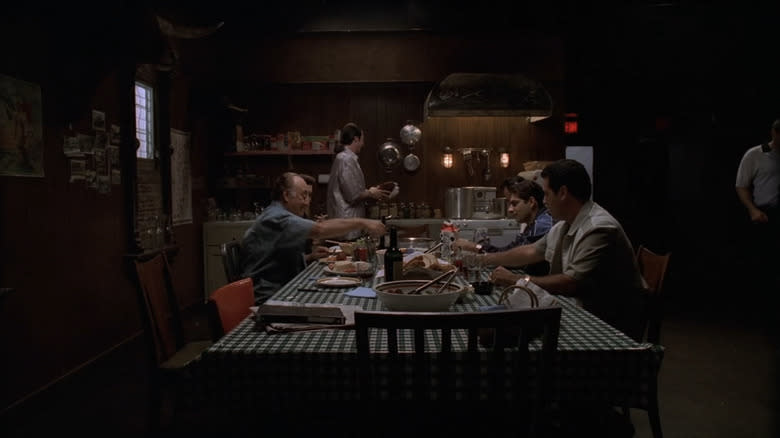
In the opening of season 3, episode 1, "Mr. Ruggerio's Neighborhood," we see Tony and the crew sit down for lunch together in the back room of Satriale's butcher shop, and given the light, jovial atmosphere, we're left to believe that this is a fairly common event. But this scene in particular has the hallmarks of a classic "Sopranos" scene, building on suspense, comedy, tensions within the crew, and of course, food.
As Tony makes his way to Satriale's butcher shop for lunch with the crew, we see the FBI attempting their most audacious scheme yet; planning to bug Tony's basement while he and the family are out of the house, which gives the casual scene an edge of tension. After cooking and serving a lunch of homemade Italian meatballs and white bread, Paulie Walnuts stays standing at the sink. Asked why, and he launches into an epic rant about the importance of hand washing after touching his shoelaces -- as always, "The Sopranos" loves to draw attention to the multitudes each character contains -- sure, do a hit before breakfast, no problem, but tie your shoes without washing your hands before lunch? No way.
The lunch also remains very tense as Patsy clearly struggles with his (warranted) suspicions that his twin brother was killed, not by a rival gang, but by his own crew. "Today would have been our birthday," Patsy says. Tony replies flippantly, "It was a f***ing tragedy. What are you going to do?"
A Rib Roast Revelation
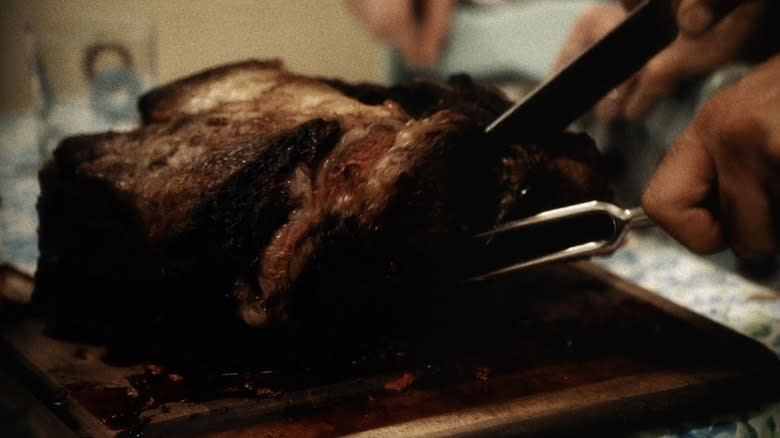
After eating a bit of the Italian salami gabagool (capicola) in his dead mother's kitchen triggers a traumatic childhood flashback, Tony discusses the memory with his psychiatrist Dr. Melfi. In the initial memory, 11-year-old Tony sees his father chop off the finger of the neighborhood butcher, Mr. Satriale, due to his outstanding gambling debts. Pleading, Satriale argues that there's an order of free meat waiting for him, which includes "gabagool, chops, and a beautiful standing roast." Melfi says that must have been frightening, to which Tony replies that it wasn't scary, no, but "a rush." Melfi pushes him to delve deeper into the memory.
After Tony and his father return home, his mother presents the stunning cooked rib roast to the family, exclaiming, "What a beautiful cut he [Satriale] sent!" As the audience and Tony know, this roast was not sent out of kindness, but desperation. As his father cuts into the roast, Tony experiences his first of many collapsing panic attacks.
As Melfi points out, this indicates a detrimental link between Tony's anxieties and fears about the bloody business that quite literally puts food on his table. Despite his assertion that it was a rush, clearly, the realities of mafia work are -- and always have been -- deeply upsetting to Tony.
Steaks And Beers With Bonpensiero
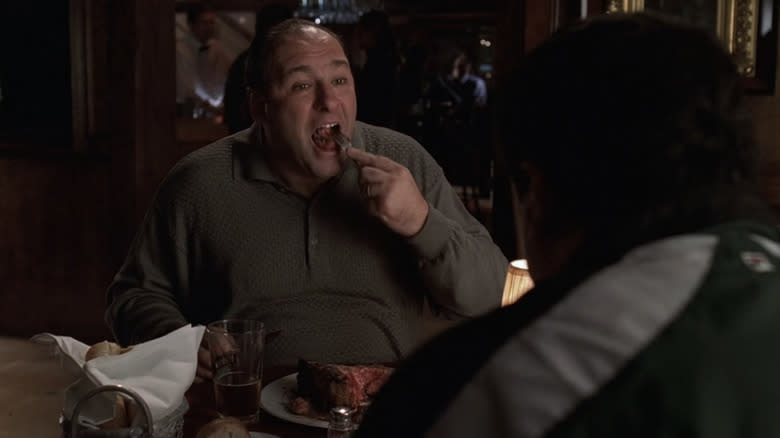
Food scenes in "The Sopranos" often defy the ultra-violent, unpleasant realities of the nature of organized crime, and Tony's own inhumanity as a result of his participation in it. One scene that perfectly demonstrates this is when Tony and associate Salvatore "Big Pussy" Bonpensiero chow down on thick cuts of fleshy steak and drink tall glasses of beer.
After telling a joke and laughing together, Tony reminds Bonpensiero that this is where they had dinner after he "popped his cherry," a euphemism for his first hit. Then he asks Bonpensiero if he believes in God. Bonpensiero, without any hesitation, says that he does. Tony joins him for a cheers. Given the light, almost reverent tone of the scene, it's hard to imagine that just before this meal, the two executed an associate, who in his last moments, desperately cried out for his mother.
"The Sopranos" constantly questions whether Tony, or anyone attached to such a violent, brutal business, can maintain some level of goodness in them. This scene is a stark look at Tony and his compartmentalization. This moment really asks whether Tony is a complicated protagonist and anti-hero, or simply a villain who wants absolution from a higher power.
Postscript: After his revelation with Melfi about the rib roast, it's worth noting that Tony's first post-hit meal was an enormous rare-cooked steak.
Read the original article on Mashed

